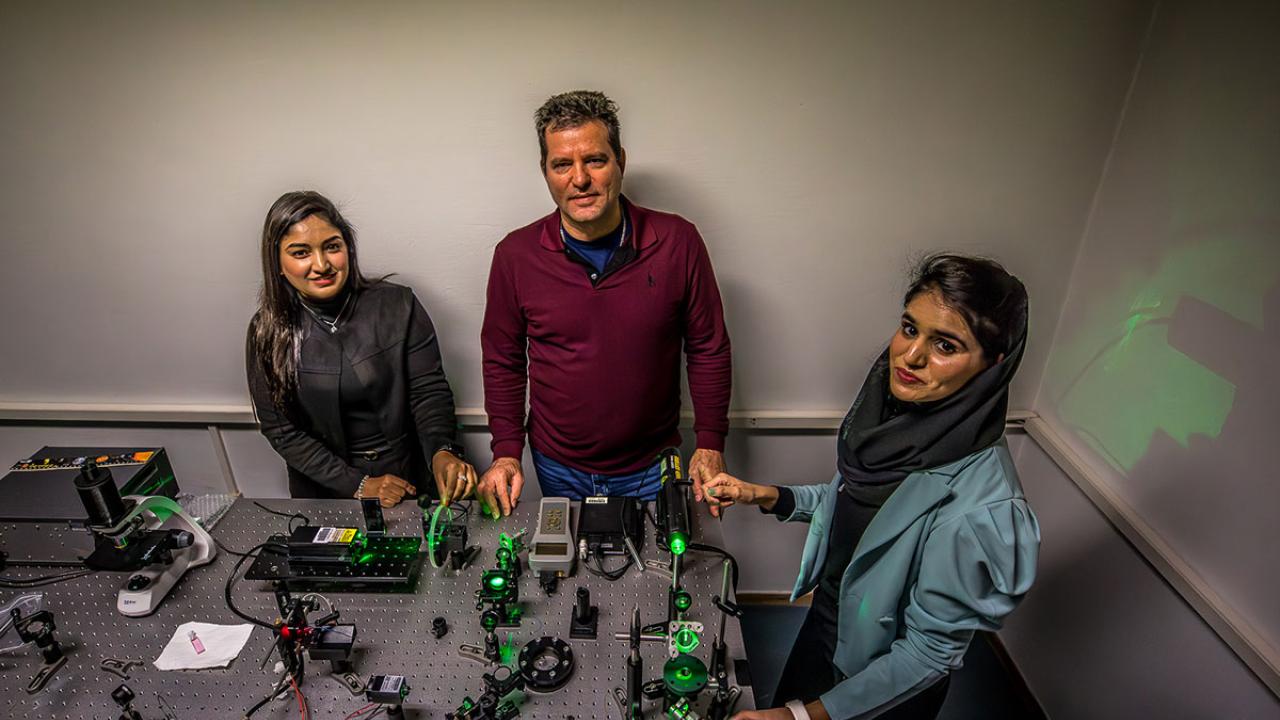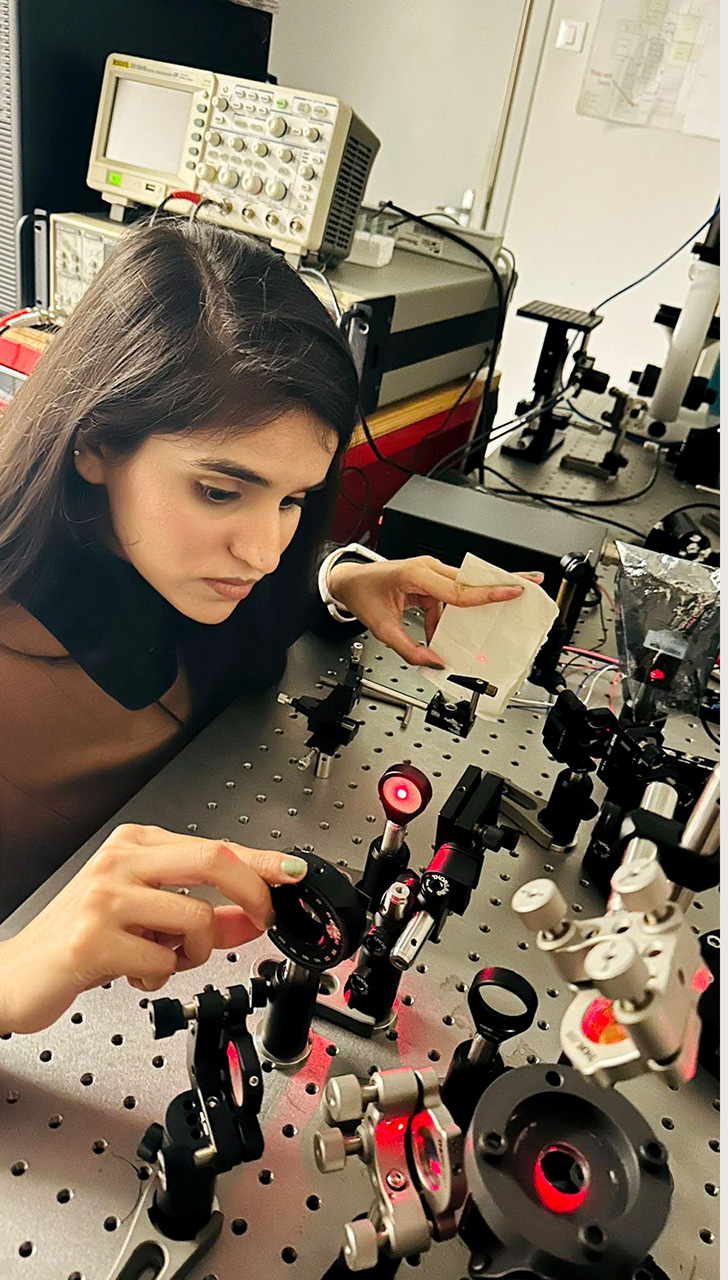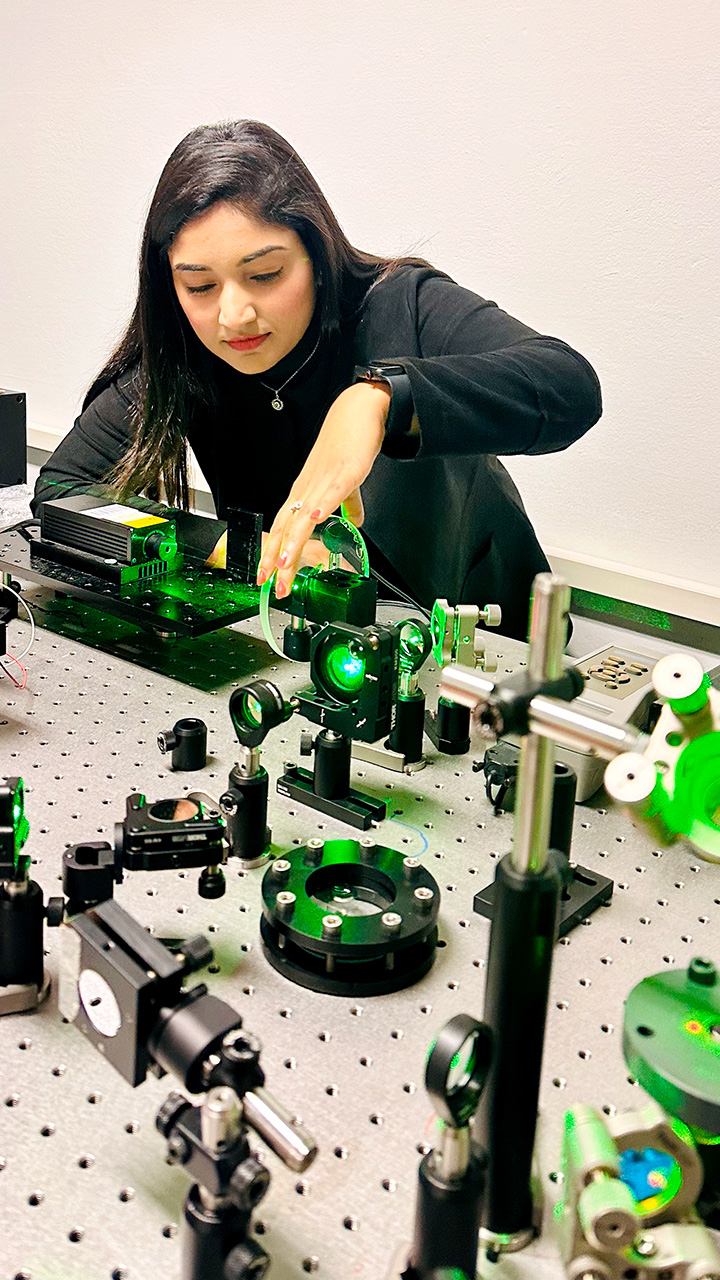
Optical technology can be particularly expensive, making it hard for researchers in the global south to carry out advanced research involving optical devices. Isma Javed and Ramna Khalid, two PhD students in electrical engineering from MicroNano Lab of Information Technology University of the Punjab Lahore, Pakistan, are currently spending three months at ICTP to use some of the Centre’s optical facilities that are not available at their home university. Through the hands-on experience they have gained working side by side with Dr. Humberto Cabrera Morales of ICTP's Multidisciplinary Laboratory (MLab), and the collaborations they were able to forge in Trieste, they will contribute to build research capacity in optics in Lahore, Pakistan. The knowledge and the skills they will have developed at the Centre will also enhance their outreach efforts to improve science education in less developed parts of Pakistan, and thus help them shape a better future for their country, which they believe relies on science and technology. Their visit is organised through the ICTP’s Training and Research in Italian Laboratories (TRIL) programme, in collaboration with the government of Pakistan.
Characterisation of metamaterials and meta-devices
As part of their PhD projects at the Information Technology University of the Punjab (ITU), Isma and Ramna, under the supervision of Dr. M. Qasim Mehmood (winner of the 2023 ICO-ICTP Gallieno Denardo Award) and Dr. Muhammad Zubair, are working to develop new meta-devices. “Meta-devices are very compact and made of metamaterials, composites whose structure is engineered at a very small scale in order to provide specific electromagnetic properties,” Isma explained.
 The meta-devices that Isma and Ramna are working on were designed for different applications. Isma develops meta-devices to be used in healthcare, while Ramna designs metamaterials for applications in optical wireless communication: together with her supervisors, she has worked on designing tuneable metasurfaces for optical communication. “Communication technologies currently rely strongly on radio signals, but the next generation of technology is based on light. One example is WiFi, which will soon be replaced by much more efficient LiFi technology,” she explained.
The meta-devices that Isma and Ramna are working on were designed for different applications. Isma develops meta-devices to be used in healthcare, while Ramna designs metamaterials for applications in optical wireless communication: together with her supervisors, she has worked on designing tuneable metasurfaces for optical communication. “Communication technologies currently rely strongly on radio signals, but the next generation of technology is based on light. One example is WiFi, which will soon be replaced by much more efficient LiFi technology,” she explained.
“Characterising meta-devices is very important to understand their properties, but it requires sophisticated and expensive equipment that we do not have access to in Pakistan. We are here to utilise the facilities available at ICTP and to develop hands-on experience in metamaterials characterisation. With the help and advice of Dr. Humberto, we were able to measure the optical properties of our own meta-devices,” Ramna explained.
During their time at ICTP, with the kind support of Dr. Humberto Cabrera they also started a collaboration with Elettra-Sincrotrone Trieste that will continue also once they return to Pakistan: Elettra will produce the meta-devices that Isma and Ramna are going to design at ITU Lahore, and ICTP will characterise them.
Designing a low-cost digital holographic microscope
Working with the optics team at ICTP's Multidisciplinary Lab also inspired Isma and Ramna to work on a low-cost digital holographic microscope. As explained by Ramna, “The advantage of a digital holographic microscope, compared to a traditional one, is that it allows for a three-dimensional characterisation of biological samples.” ICTP provided for the components of the microscope, which are all low-cost and 3D printed. “Dr. Humberto followed us on every step of assembling the microscope and that was a very rewarding experience,” Ramna added.
“The most interesting aspect about this project is that we will be able to bring the microscope to Pakistan, then replicate it and improve it. Optics equipment is very expensive and we are very happy to be able to bring this microscope back home. We will use it for research and, because it is low cost, also for the many educational and training activities that we organise there,” Isma explained. “We are also planning to improve the microscope by integrating an AI technology that will allow for real-time diagnostics of various diseases. We would like to develop a low-cost commercial solution that hospitals will be able to use,” Ramna added.
Organising and partaking in outreach activities
In addition to their research, Isma and Ramna volunteer to promote education in optics and photonics in remote areas of Pakistan, where people lack even the most basic knowledge in science and technology. “In Pakistan, as in other developing countries, we are always facing many challenges related to the lack of resources and of education,” Isma said. “I have always felt the duty to serve my community and I believe that education can be used as a transformative power to bring technological progress, develop the economy of our country, and improve our people’s standard of life. Volunteering in these outreach activities allows me to combine science with community service, and this makes me very happy,” she continued.
Their volunteer work is part of their respective roles within the SPIE Student Chapter at ITU, Lahore, of which Ramna is the current president for 2023 and Isma the president elects for 2024. SPIE is the international society for optics and photonics and it brings together engineers, scientists, students, and business professionals working on light-based science and technology. The organisation has several ‘chapters’, or branches, around the world, including some led by students, whom it supports for optics and photonics education and research.
 Isma and Ramna are both also very involved in organising conferences and seminars for BSc and MSc students. “These activities help the students to stay motivated and they also stimulate us to always do our best. They are great fun for us too! Moreover, by engaging in outreach actions, we are improving our skills and we are getting better and better at sharing our knowledge and at adapting our presentations to different audiences,” Ramna explained.
Isma and Ramna are both also very involved in organising conferences and seminars for BSc and MSc students. “These activities help the students to stay motivated and they also stimulate us to always do our best. They are great fun for us too! Moreover, by engaging in outreach actions, we are improving our skills and we are getting better and better at sharing our knowledge and at adapting our presentations to different audiences,” Ramna explained.
At ICTP they shared their science enthusiasm by volunteering for two outreach events for middle school students who visited the Centre. “These were joint events between the STI Unit, the SPIE-ICTP anchor research program in optics and the ITU SPIE chapter,” Ramna explained. “We love doing these types of activities and every time we are greatly helped by SPIE in this. The society provides us with kits containing equipment for hands-on sessions aimed to demonstrate basic concepts in optics,” Isma added.
“In Lahore, we are also part of the Women in Engineering Society. Recently, we have invited different chief experts from various fields, who have shared their experience with other women in order to encourage them to play a role in science and contribute to the progress of our country. Making progress will need all of us,” Isma concluded.
















